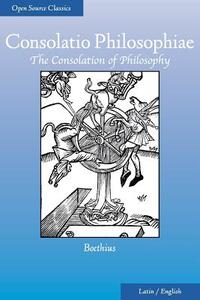Take a photo of a barcode or cover
This was a wonderful read and one I will need to revisit. I recommend Chapter 5 for all those interested in the question of Fate vs. Free Will.
Boethius, in exile awaiting his execution, consoles himself through discourse with the lady Philosophy. In an effort to "nurse" his soul back to health, they discuss the nature of truths of mortal life through the thought of various philosophers, including Plato, Aristotle, and Plotinus.
It was very easy for me to follow Philosophy's line of reasoning in most cases. I very nearly forgot that this was written 1490 years ago! I suppose the nature of philosophy is that, at its core, it finds eternal truths, and true philosophy will always remain true. Many interesting concepts, although I have challenges to many of the conclusions they come to. However, as an introduction to topics like God and the nature of good and evil or free will, it seems a sturdy base. Certainly many works branch from this, and there's plenty here to think about!
A good translation! Very easy to read and understand, given the time to check out the footnotes for background info.
It was very easy for me to follow Philosophy's line of reasoning in most cases. I very nearly forgot that this was written 1490 years ago! I suppose the nature of philosophy is that, at its core, it finds eternal truths, and true philosophy will always remain true. Many interesting concepts, although I have challenges to many of the conclusions they come to. However, as an introduction to topics like God and the nature of good and evil or free will, it seems a sturdy base. Certainly many works branch from this, and there's plenty here to think about!
A good translation! Very easy to read and understand, given the time to check out the footnotes for background info.
Interesting arguments but not as comforting or convincing as you may hope for. Some interesting attempts to explain the problem of evil (unfortunately somewhat unconvincing) and some interesting early discussion of free will vs divine foreknowledge.
Sure, it's supposedly the most important philosophical work of medieval times, but it was boring as Hell and made me want to die.
inspiring
reflective
slow-paced
inspiring
reflective
fast-paced
inspiring
reflective
medium-paced
challenging
emotional
hopeful
informative
inspiring
mysterious
reflective
medium-paced
challenging
reflective
slow-paced
The now that passes produces time, the now that remains produces eternity.
All fortune is good fortune; for it either rewards, disciplines, amends, or punishes, and so is either useful or just.
Written from a Pavian prison in 523 CE, The Consolation of Philosophy questions the mechanics of Fortune, Providence, and the moral and theological implications of theodicy. How, our author asks us, might philosophy vindicate God? Boethius' work is a testament to early medieval scholarship and the persistence of classical thought. His grasp of Greek tradition and mythology is striking, as is his dedication to Nature and the ineffable Good in the face of execution. How much is his attempt to quell his fear of death? Studied through the (albeit Soviet-saturated) lens of prison literature, Boethius' motivations take on a Camusian tenor; the final words of a condemned man are still resonant fifteen-hundred years later. The remarkable medieval veneration of his text fulfills the very notion of blessed Providence Boethius advances.
All fortune is good fortune; for it either rewards, disciplines, amends, or punishes, and so is either useful or just.
Written from a Pavian prison in 523 CE, The Consolation of Philosophy questions the mechanics of Fortune, Providence, and the moral and theological implications of theodicy. How, our author asks us, might philosophy vindicate God? Boethius' work is a testament to early medieval scholarship and the persistence of classical thought. His grasp of Greek tradition and mythology is striking, as is his dedication to Nature and the ineffable Good in the face of execution. How much is his attempt to quell his fear of death? Studied through the (albeit Soviet-saturated) lens of prison literature, Boethius' motivations take on a Camusian tenor; the final words of a condemned man are still resonant fifteen-hundred years later. The remarkable medieval veneration of his text fulfills the very notion of blessed Providence Boethius advances.




